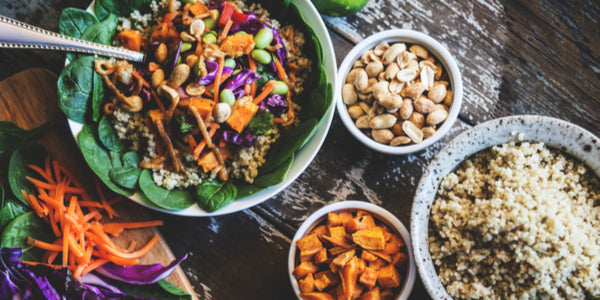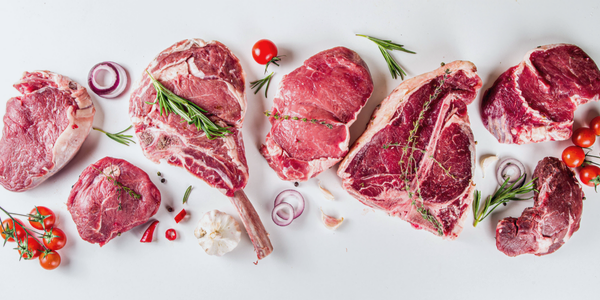
If you’re a meat-lover, eating plant-based can sound like quite the sacrifice. However, vegetarian eating has its benefits, and it isn’t just salads for all three meals.
There are many types of vegetarians, including those who eat fish, eggs, and dairy. Join us as we discover the different types of vegetarian diets and how to choose a vegetarian diet that’s right for you.
What Is Vegetarianism?
By the most simple definition, a vegetarian is someone who doesn’t eat meat. Some types of vegetarians also choose not to consume animal products or byproducts, like dairy, eggs, or honey.
When you’re used to eating these foods, deciding not to eat them can initially sound scary. However, the appeal of eating more plant-based foods often comes down to prioritizing health benefits. Eating more plant-based foods has been linked to improved health outcomes, such as reducing the risk of high blood pressure or heart disease.
Fortunately, many plant foods taste good, too! Filling more of your plate (at least half) with fruits and vegetables can help you meet your daily nutrient needs. When you focus on filling your plate with more plants, you will likely leave fewer healthy options—like processed foods or red meat—behind.
6 Different Types of Vegetarian Diets
Wondering what type of vegetarian diet is right for you? Read on for the six main types of vegetarian diets. (Spoiler alert, there’s something for everyone!)
1. Vegan
Vegan diets are often considered the most strict on the spectrum of plant-based diets. They avoid all animal-based products, and some vegans even avoid animal byproducts like honey.
While vegan diets aren’t for the faint of heart, they are linked with extraordinary health benefits. Eating a nutritionally complete vegan diet may help reduce the risk of developing chronic diseases like diabetes, cancer, or heart disease.
2. Vegetarian
As mentioned above, the term “vegetarian” is broad, and encompasses many kinds of plant-based eaters. In general, a vegetarian avoids all meat and eats a diet pattern with plenty of the following foods:
• Fruits and vegetables
• Grains
• Legumes (beans, peas, and lentils)
• Nuts and seeds
Many people find trying vegetarian before committing to a fully vegan diet helpful.
3. Lacto-Ovo Vegetarian
As the name suggests, on a lacto-ovo vegetarian diet, dairy products and eggs are included. You may wonder, “Why bother when the whole point is to avoid animal products?”
Eating eggs and dairy makes you more likely to meet your daily requirement for vitamin B12—a nutrient vegetarians are more likely to be deficient in. Plus, eggs and dairy provide plenty of protein, which helps to provide a feeling of satiety or fullness.
4. Lacto-Vegetarian
Similar to lacto-ovo vegetarians, lacto-vegetarians eat dairy but not eggs. Many people pick this eating pattern for the same reasons lacto-ovo vegetarians do. Including dairy in the diet can help ensure the body is getting enough of the nutrients it needs.
Namely, milk and cheese provide calcium for bone health and plenty of protein to help the body function optimally. While plant-based foods like beans, nuts, and seeds can provide protein, dairy is considered one of the most nutrient-rich animal protein sources and can supplement a primarily plant-based diet.
5. Pescatarian
Pescatarian diets are unique compared to other vegetarian diets, allowing for quite a bit of flexibility and room for personal preference. In general, pescatarians avoid all meat except for fish and seafood. Some pescatarians also choose to eat dairy and eggs, too.
Like a lacto- or lacto-ovo vegetarian diet, including fish and seafood on the menu increases the likelihood a person will meet all their nutritional needs. In particular, fish are a great source of healthy fats like omega-3 fatty acids, which can be hard to come by when eating only plants. Some health benefits linked with this diet include:
• Decreased risk of certain cancers
• Good gut health
• Improved heart health
Like dairy and eggs, fish provide protein, which can help you feel full and better respond to appetite cues. Seafood also counts as lean protein, which means it’s a nutrient-rich source of animal protein that provides plenty of vitamins and minerals (with the added saturated fats).
Some fish can be higher in mercury levels, so it’s important to eat seafood in moderation and as part of a balanced eating pattern—like the Mediterranean diet.
6. Flexitarian
The flexitarian diet, also known as a semi-vegetarian diet, is a flexible vegetarian diet. Like a pescatarian diet, a flexitarian diet leaves much room for personalization.
Typically, flexitarians only eat a small amount of meat, maybe once or twice a week. However, a flexitarian diet can be tailored to fit your needs. It can be as simple as adding more plants—like fruits, vegetables, legumes, and grains—to your plate each meal, participating in a “Meatless Monday” challenge, or eating meat on the weekends.
Some studies suggest a flexitarian diet may be a good fit for people who like to eat meat but have been told to eat more plant-based foods for health reasons. For example, meat may cause digestive upset in people with inflammatory bowel diseases. Switching to a flexitarian diet may provide some sense of relief from troublesome symptoms.
How to Choose a Vegetarian Diet
So, which diet might be right for you? It all depends on your “why.” Besides health benefits, there are many other reasons people choose to eat more plant-based.
While the following considerations are more complex in nature, limitations such as cost or accessibility may also play a role. After diving into these deeper motives, it may make sense to see how practical following a vegetarian diet may be for you and your lifestyle.
Examine Your Ethics
Many people are drawn to a vegan lifestyle for health and ethical reasons. Some people believe killing or harming animals is a serious offense, and eating vegan is seen as a way to reduce suffering.
In many cases, vegans don’t limit their lifestyle to eating but also seek cruelty-free clothing, cleaning products, and other vegan items. For example, vegan leather products are available to help vegans stay in style without compromising their ethics.
If you’re tending towards vegetarian eating for ethical reasons, it can be helpful to ask yourself, “What do I believe about the value of an animal’s life?” Your answer can help you decide what diet is right for you. For example, you may eat animal byproducts (such as eggs) but not animal-based food (such as chicken).
Evaluate Environmental Impact
Generally, a vegetarian diet is a great way to impact the planet positively. Animal-based products often require many natural resources to produce, and not all are renewable. Typically, plant-based foods put less strain on the environment, and are less likely to lead to serious environmental problems like pollution.
Food companies are finding it more trendy to display their environmental impact. This is especially true of companies and restaurants with plant-based options. For example, when ordering food through the Chipotle restaurant app, you can see statistics that estimate how many resources you saved.
If the environment and preserving the earth’s resources for future generations are important, you can manifest that value in your life through vegetarian eating. Similar to how vegetarianism is a great way to ease into veganism, starting out with a flexitarian diet may help ease the transition while still showing that you are trying to improve the planet.
Consider Religious Requirements
An often overlooked aspect of vegetarianism is where it fits into religion. Depending on your level of adherence to a religion or religious tradition, you may choose to eat in a certain way.
For example, members of The Church of Jesus Christ of Latter-Day Saints abide by an eating pattern called the “Word of Wisdom.” This pattern dictates that fruits, herbs, vegetables, and grains can be eaten abundantly, but certain meats should be eaten sparingly or in moderation. Followers of this religious tradition believe that the blessing of physical health can follow by staying true to this pattern of living.
Alternatively, some Christian religions observe a practice called Lent. During this time, people may stop eating certain foods (i.e. red meat) to connect more with the deity. In these traditions, it’s often thought that abstaining from a practice or food is a form of self-mastery over the physical body and its appetites, which (in turn) is believed to be a way to become more holy or divine.
Another religious practice, Jainism, focused on nonviolence, instructs followers not to eat meat and to avoid certain roots or vegetables. This idea of “do no harm” or ahimsa, is also followed by Hindus, though they often have a different interpretation. The majority of Hindu people follow a vegetarian or lacto-vegetarian diet.
Many other religions—like Islam, Buddhists, and Seventh-day Adventists—have unique ideas about how food should be consumed. Luckily, how, when, and why you adhere to these traditions is entirely up to you! If you’re worried about getting enough nutrients while eating plant-based and according to your religious practice, a dietitian can help you navigate the best way to obtain all your vitamins and minerals from foods and supplements.
The Final Word on Foods for Different Types of Vegetarians
Many options exist if you want to eat a more plant-based eating pattern. Start out by examining your “why,” which may be health, ethical, environmental, or religious reasons for tending to plants. Then, you can select the pattern, such as flexitarian or lacto-vegetarian, that makes the most sense for you and helps you get all the nutrients you need.
References:
Cleveland Clinic. What Is the Pescatarian Diet? Health.clevelandclinic.org. Published January 2023.
Derbyshire EJ. Flexitarian Diets and Health: A Review of the Evidence-Based Literature. Front Nutr. 2016;3:55.
Klemm S. Vegetarianism: The Basic Facts. Eatright.org. Published October 2021.
Marrone G, Guerriero C, Palazzetti D, Lido P, Marolla A, et al. Vegan Diet Health Benefits in Metabolic Syndrome. Nutrients. 2021;13(3):817.
Patience S. Religion and dietary choices. Independentnurse.co.uk. Published September 2016.






